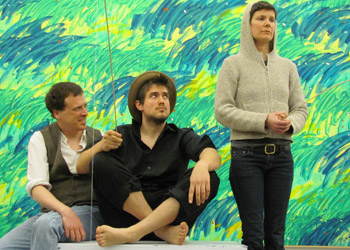“But suddenly,” says the narrator of Anton Chekhov’s satirical short story “The Death of a Clerk,” about to describe an unexpected, life-changing sneeze. And then he pauses. “This ‘but suddenly’ occurs often in stories,” he states. “The authors are right: life is so full of the unexpected!”
This self-conscious aside sets the tone for On Word, the August Company’s second annual potpourri of short theater pieces derived from literature not originally written for the stage, all related to a single word. This year’s word is “Chekhov,” with most of the scenes and sketches adapted from the great Russian playwright’s lesser-known prose works.
Director Liesel de Boor, whose prime m?tier is film, says she’s drawn above all to “Chekhov’s eye—that loving, amused eye that stands at a distance and watches.” His themes, like his characters, are ordinary and universal: “Love, desire, people’s aspirations to be other than they are, and finding true happiness in accepting themselves.” Regarding that last topic, she adds, “He’s a bit of a Buddhist.”
The pieces are poignant, ironic, humorous, sorrowful—sometimes all in one scene—but never gloomy. “When people think of Chekhov they often think ‘depressing and slow,'” de Boor says. “But more and more people are tapping into how funny he is. Sad, too, but not depressing, because Chekhov really gets people. He’s such a fan of humanity, even when we are at our worst. It’s that understanding of people—when we do things that are so like us that they define us. I find that delightful.”
De Boor became a fan of Chekhov in film school, when her favorite teacher, the Czech director Vojtech Jasny, suggested she read his short stories “to learn more about small moments.” She’s been “a bit obsessed ever since, and I thought the stories were a good match for the August Company’s mission—to be human, mirthful and true.”
Most of the scenes are performed by the young cast of 10 in story-theater style, with the actors speaking the narration as well as the dialogue. There’s an ensemble journey in a crowded railway car; an amusing “declaration of non-love” by the unwilling subjects of an arranged marriage; an agonized confrontation between an estranged married couple; a surreal afternoon of fishing; and an episodic “Diary of an Assistant Bookkeeper” whose hopes of promotion hang on the death of his superior.
There are also Chekhovian pieces not by Chekhov, including a Raymond Carver story about the author’s death, and a sketch featuring that other Chekhov, Pavel (“Anton’s distant cousin, perhaps?” de Boor muses), concocted from scenes in Star Trek VI and performed by action figures. Musical allusions to three of Chekhov’s plays appear in distinctively 20th-century songs about seagulls, sisters and cherries.
The theme is stretched even further in a commentary on “The Russian Character,” drawn from a variety of Web descriptions, and into the intermission, when shots of ice-cold vodka are served.”
On Word: Chekhov: April 14-16, 7 and 9 p.m., A.P.E. at Window, 126 Main St., Northampton, august-company.com.



